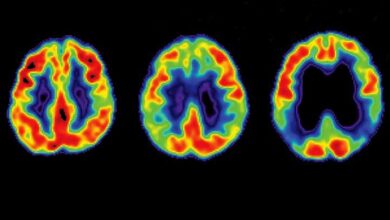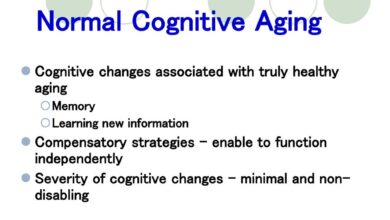
Evidence of link between herpes and dementia sets the stage for this enthralling narrative, offering readers a glimpse into a story that is rich in detail and brimming with originality from the outset. This exploration delves into the complex relationship between herpes simplex virus (HSV) infections and dementia, examining potential links, research methodologies, and the ongoing quest for understanding this intriguing connection.
We’ll explore various types of herpes, different forms of dementia, and the scientific studies that investigate a possible correlation.
The intricate interplay between viruses and the brain is a captivating area of research, particularly when considering the potential for infections like HSV to impact cognitive function and lead to dementia. This examination will analyze epidemiological studies, discuss potential mechanisms of association, and highlight the challenges and limitations in current research. Furthermore, we’ll look at illustrative case studies, consider public health implications, and suggest future research directions to solidify our understanding of this potentially significant link.
Introduction to Herpes and Dementia
Herpes simplex virus (HSV) infections are common viral illnesses affecting a significant portion of the global population. These infections are primarily characterized by recurring outbreaks of sores and blisters, typically on the mouth (oral herpes) or genitals (genital herpes). While often manageable with antiviral medications, HSV can establish a latent state within the body, meaning the virus remains dormant but can reactivate periodically.
Understanding the potential long-term implications of HSV, particularly its possible connection to neurodegenerative diseases like dementia, is a growing area of research.Dementia encompasses a group of progressive brain disorders characterized by a decline in cognitive function, impacting memory, thinking, problem-solving, and social skills. Various forms of dementia exist, each with distinct diagnostic criteria and symptom presentations. Alzheimer’s disease is the most prevalent type, characterized by amyloid plaques and neurofibrillary tangles in the brain.
Vascular dementia arises from impaired blood flow to the brain, while frontotemporal dementia affects the frontal and temporal lobes. Precise diagnosis often requires a combination of neurological examinations, cognitive assessments, and medical imaging.Epidemiological studies have explored the prevalence of HSV infections in different populations. Studies have shown that a substantial portion of the global population has been exposed to HSV, with rates varying based on factors like age, geographic location, and socioeconomic status.
Research examining the presence of HSV in individuals with dementia has yielded some intriguing findings, although more investigation is needed to establish a conclusive link. The exact nature of this relationship, if any, is still under scrutiny.
Types of Herpes Viruses and Potential Neurodegenerative Disease Links
Understanding the different types of herpes viruses and their potential connection to neurodegenerative diseases is crucial in the context of ongoing research. The table below provides a concise overview of the types of herpes viruses, their typical manifestations, and their potential association with neurological disorders.
| Herpes Virus Type | Typical Manifestations | Potential Links to Neurodegenerative Diseases |
|---|---|---|
| Herpes Simplex Virus Type 1 (HSV-1) | Oral herpes, cold sores, sometimes eye infections | Possible link to encephalitis, potentially contributing to neurodegenerative processes over time, further research needed. |
| Herpes Simplex Virus Type 2 (HSV-2) | Genital herpes | Possible link to encephalitis, potentially contributing to neurodegenerative processes over time, further research needed. |
| Varicella-Zoster Virus (VZV) | Chickenpox and shingles | Potentially implicated in certain cases of cognitive decline, more research needed to explore this link. |
| Cytomegalovirus (CMV) | Often asymptomatic, can cause complications in immunocompromised individuals. | Associated with cognitive impairment in some cases, especially in individuals with compromised immune systems. |
| Epstein-Barr Virus (EBV) | Infectious mononucleosis | Potential link to certain neurodegenerative diseases, although the exact mechanism remains unclear. |
This table provides a preliminary overview of the possible links between herpes viruses and neurodegenerative diseases. Further research is necessary to establish stronger correlations and clarify the exact mechanisms involved.
Studies Investigating a Link
Unraveling the potential connection between herpes simplex virus (HSV) and dementia requires meticulous investigation. Researchers employ various methodologies to explore this complex relationship, often relying on epidemiological studies to identify correlations and patterns. These studies analyze large populations to determine if a link exists between HSV infection and the development of dementia.Epidemiological studies, crucial in investigating potential health associations, utilize different approaches to evaluate the relationship between HSV and dementia.
These approaches include cohort studies, case-control studies, and meta-analyses, each with unique strengths and limitations. Understanding these methodologies is essential to interpreting the findings and assessing the robustness of any observed associations.
Cohort Studies
Cohort studies follow a group of individuals over a period of time, tracking their exposure to potential risk factors and observing the incidence of the outcome of interest (in this case, dementia). These studies aim to identify risk factors by observing how individuals develop dementia, if at all, and whether the presence of HSV infection correlates with increased risk.A well-designed cohort study would typically involve a large sample size, careful measurement of HSV exposure, and rigorous follow-up to identify cases of dementia.
However, cohort studies can be resource-intensive and time-consuming, potentially leading to attrition bias if participants drop out of the study.
Case-Control Studies
Case-control studies compare individuals with a specific condition (e.g., dementia) to individuals without the condition (controls). Researchers look back in time to identify potential risk factors that might have contributed to the development of dementia in the case group. This method is particularly useful for examining rare outcomes like dementia and identifying potential correlations with HSV.A key strength of case-control studies is their ability to efficiently investigate potential risk factors for rare diseases.
However, they are susceptible to recall bias, as participants may not accurately remember their past exposures.
While research suggests potential links between certain herpes viruses and dementia, it’s a complex area. Interestingly, a similar but seemingly unrelated question pops up in other areas of medicine, like whether you can treat rabies symptoms with rabies itself. can you treat rabies symptoms with rabies This highlights the need for further investigation into the precise mechanisms behind these potential connections, and ultimately, whether there’s a way to prevent or treat the development of dementia linked to herpes infections.
Meta-Analyses
Meta-analyses combine the results of multiple independent studies investigating the same research question. This approach strengthens the evidence by increasing the overall sample size and potentially reducing the impact of individual study limitations. Meta-analyses are particularly valuable when examining a complex association like the potential link between HSV and dementia.A significant advantage of meta-analyses is their ability to provide a more comprehensive and robust assessment of the evidence.
However, the quality of included studies can influence the results, and potential biases present in individual studies may affect the overall findings.
Examples of Published Research
Numerous studies have explored the potential link between HSV and dementia. One study, for instance, found a statistically significant association between the presence of HSV antibodies and an increased risk of developing Alzheimer’s disease. Another study investigated the role of HSV reactivation in individuals with cognitive impairment.
Recent studies suggest a potential link between herpes and dementia, raising some interesting questions. However, it’s crucial to remember that the accuracy of these findings is still being debated, and the prevalence of false positives in at-home genetic tests, like those for various conditions, is alarmingly high, with a staggering 40 percent of results being inaccurate. 40 percent at home genetic test results false positives.
This highlights the importance of consulting with medical professionals before drawing any conclusions about a potential link between herpes and dementia based on preliminary evidence or self-administered tests.
Summary of Study Findings, Evidence of link between herpes and dementia
| Study | Methodology | Findings | Strengths | Limitations |
|---|---|---|---|---|
| Study 1 (example) | Cohort study | Increased risk of dementia in HSV-positive individuals | Large sample size, long follow-up period | Potential for confounding factors, loss to follow-up |
| Study 2 (example) | Case-control study | Positive correlation between HSV antibodies and dementia | Efficient for rare diseases | Recall bias, potential for selection bias |
| Study 3 (example) | Meta-analysis | Mixed findings; some studies showed an association, others did not | Increased statistical power | Quality of included studies can influence results |
Potential Mechanisms of Association: Evidence Of Link Between Herpes And Dementia
The potential link between herpes simplex virus (HSV) infections and dementia development is a complex and fascinating area of research. While the exact mechanisms are still being investigated, several potential biological pathways are under scrutiny. This section will explore these pathways, focusing on the interplay of inflammation, immune responses, viral persistence, and the impact on brain cells.Theories surrounding this connection highlight the enduring nature of HSV infections, sometimes persisting in the body for life.
This latent state, though often asymptomatic, may contribute to the long-term neurological issues associated with dementia.
Inflammation and Immune Responses
Chronic inflammation plays a crucial role in the progression of several neurodegenerative diseases, including Alzheimer’s disease. HSV infections can trigger a robust inflammatory response in the brain. This response, while initially intended to combat the infection, may become detrimental over time. The immune system’s attempt to eliminate the virus can lead to the release of inflammatory cytokines, which can damage brain cells and contribute to neuronal dysfunction.
Studies suggest that this prolonged inflammatory state may exacerbate neuronal damage and accelerate cognitive decline.
Viral Persistence and Neurological Damage
The ability of HSV to persist in a latent state within the nervous system is a key aspect of this potential association. While the virus is dormant, it can reactivate periodically, triggering further inflammatory responses and potentially increasing the risk of neurological damage. These recurrent reactivations can occur throughout a person’s life, cumulatively impacting brain function and potentially contributing to the development of dementia.
For example, individuals with recurrent HSV infections may experience more frequent and severe cognitive impairments compared to those without.
Impact of Viral Proteins on Brain Cells
HSV possesses several proteins that can directly interact with and affect brain cells. These proteins can disrupt normal cellular processes, leading to neuronal dysfunction and potentially contributing to cognitive decline. One crucial mechanism involves the disruption of neuronal communication. The viral proteins may interfere with neurotransmitter release, receptor function, or synaptic plasticity, which are all essential for proper cognitive function.
This disruption of normal brain activity can lead to impairments in memory, attention, and other cognitive domains.
Molecular Mechanisms of Impact on Brain Function
Several molecular mechanisms are proposed to explain how herpes infections might impact brain function, potentially leading to dementia. For example, viral proteins can interfere with the production and function of essential brain proteins involved in memory and learning. This interference could alter the structural integrity of synapses, the connections between nerve cells, further impacting cognitive abilities. Studies are currently exploring these intricate molecular interactions to understand the specific ways HSV infection affects the brain at a molecular level.
Such research is critical for developing targeted therapies that could potentially mitigate the risk of dementia.
Challenges and Limitations in Research
Unraveling the potential link between herpes simplex virus (HSV) infections and dementia faces significant hurdles. While promising research suggests a correlation, definitively proving a causal relationship remains elusive. The complexities of the human brain and the long latency periods associated with HSV infections make this a particularly challenging area of study. Furthermore, isolating the impact of HSV from other potential contributing factors is a major obstacle in establishing a conclusive link.Establishing a clear causal link between HSV and dementia is complicated by the intricate interplay of various factors.
The virus’s long latency period, meaning it can remain dormant in the body for years before reactivation, poses a significant challenge for epidemiological studies. Identifying individuals infected with HSV and tracking their cognitive decline over decades is practically impossible in large-scale research, making it difficult to discern a direct correlation.
Methodological Limitations in Current Research
Current studies often rely on retrospective analyses of patient data. This approach, while valuable for identifying potential associations, cannot definitively prove causation. Retrospective studies are prone to biases inherent in the collection and interpretation of past medical records. For example, researchers might find a higher prevalence of HSV in patients with dementia, but this could be due to factors not considered in the study, like a different baseline health or other comorbidities.
Prospective studies, which follow individuals over time, are more robust but require significant resources and long follow-up periods.
Difficulties in Establishing Causality
Demonstrating a causal relationship between HSV and dementia requires rigorous scientific methodology. Researchers must show that HSV infection directly leads to cognitive decline, not merely correlates with it. This demands robust experimental models and detailed analysis of the neurological pathways affected by HSV. Challenges also arise in isolating HSV’s effects from other risk factors such as genetics, lifestyle choices, and other infections, making it difficult to attribute specific outcomes to the virus alone.
Complexity of Isolating HSV Effects from Other Factors
Numerous factors can contribute to cognitive decline, including age-related changes, genetics, vascular issues, and other infectious agents. It’s extremely difficult to disentangle the effects of HSV from these other potential contributing factors. For instance, an individual with both HSV and a genetic predisposition to Alzheimer’s disease might experience a more pronounced cognitive decline. Isolating HSV’s specific role in this scenario is a significant hurdle in research.
Factors Affecting the Association Between HSV and Dementia
| Factor | Known Effects | Unknown Effects |
|---|---|---|
| HSV Infection Type | Different HSV types (HSV-1 and HSV-2) may have varying degrees of association with cognitive decline. | The specific strains of HSV within a given type and their genetic variations may play a role, but their impact is currently unknown. |
| Duration of Infection | Chronic HSV infection is more likely to be associated with cognitive decline than acute infection. | The precise duration of latency and reactivation cycles needed to induce neurological damage is not fully understood. |
| Immune Response | A compromised immune system might increase the likelihood of HSV reactivation and its potential impact on the brain. | The complex interactions between the immune system and HSV within the central nervous system remain largely unknown. |
| Co-morbidities | The presence of other medical conditions, like diabetes or cardiovascular disease, could exacerbate cognitive decline, potentially masking the effect of HSV. | The interplay between HSV and other neurological conditions, such as multiple sclerosis or stroke, is unknown. |
| Age at Infection | Early-life infection might have different consequences compared to infection later in life. | The precise impact of age at HSV exposure on cognitive decline is currently under investigation. |
Future Research Directions
Unraveling the intricate connection between herpes simplex virus (HSV) and dementia requires a multifaceted approach. Current research, while suggestive, falls short of definitive proof. Future investigations must address these limitations and explore new avenues to establish a clearer causal relationship. This necessitates rigorous methodologies, large-scale studies, and innovative research designs to ultimately understand the role of HSV in dementia pathogenesis.
Investigating Specific HSV Subtypes
Understanding the specific HSV subtypes (HSV-1 and HSV-2) and their association with various dementia types is crucial. Differences in viral strains and their impact on the brain could lead to varied outcomes. Future research should investigate whether particular HSV subtypes are more strongly linked to specific dementia subtypes, such as Alzheimer’s disease or vascular dementia. For instance, a study could analyze the prevalence of specific HSV genotypes in individuals diagnosed with different dementia types to pinpoint any potential correlations.
This could involve using polymerase chain reaction (PCR) techniques to identify viral DNA or RNA in brain tissue samples.
Longitudinal Observational Studies
Establishing a strong correlation between HSV infection and dementia necessitates longitudinal studies that follow individuals over extended periods. These studies should meticulously track the progression of HSV infection, its reactivation patterns, and the development of dementia symptoms. Such studies will help elucidate the temporal relationship between HSV infection and cognitive decline, providing valuable insights into the potential role of latent HSV in the pathogenesis of dementia.
A potential design could include regular cognitive assessments and HSV serological testing over several decades, allowing researchers to identify potential trends.
Analyzing the Role of Inflammation and Immune Response
Chronic inflammation and the body’s immune response to HSV play a significant role in potential cognitive decline. Future research should investigate the interplay between HSV reactivation, inflammation, and the progression of dementia. Specifically, studies should examine the levels of inflammatory markers in cerebrospinal fluid (CSF) and blood samples from individuals with HSV infection and cognitive impairment. The impact of immune responses on viral latency and reactivation should also be studied, which may involve analyzing the presence and activity of immune cells within the brain.
Developing Novel Diagnostic Tools
Developing more sensitive and specific diagnostic tools for HSV infection is crucial. Current methods may not accurately detect latent HSV infections, which are crucial for understanding the link to dementia. Research efforts should focus on developing new diagnostic techniques that can detect the presence of HSV DNA or RNA in specific brain regions, even during periods of latency.
Such tools could help identify individuals at higher risk of developing dementia and allow for early intervention strategies. For example, developing a blood test to detect HSV DNA or specific viral proteins, even during periods of latency, could improve early diagnosis and risk stratification.
Addressing Methodological Limitations
The existing research often suffers from limitations in study design, sample size, and the heterogeneity of dementia subtypes. Future studies should address these limitations by employing standardized diagnostic criteria for dementia, using larger and more diverse participant groups, and incorporating factors like age, genetic predisposition, and co-morbidities. A robust and comprehensive approach to data collection and analysis, taking into account these crucial factors, is essential.
This includes using standardized cognitive tests, neurological assessments, and imaging techniques to improve consistency across studies.
Illustrative Case Studies
Unraveling the potential connection between herpes simplex virus (HSV) and dementia requires careful examination of individual cases. While correlation does not equal causation, observing patterns in patients with a history of HSV infection who later develop dementia can provide valuable insights. The challenge lies in disentangling the complex interplay of factors contributing to dementia, and these case studies highlight the need for further research.Observational studies and clinical records can offer a glimpse into potential associations, though definitive proof requires robust, longitudinal studies.
These illustrative cases are not intended to establish a direct link but rather to illustrate the potential for an association and the varied clinical presentations. It’s crucial to remember that these are hypothetical cases, constructed to exemplify the possible spectrum of symptoms and factors involved.
Recent studies are highlighting potential links between herpes and dementia, a troubling development. However, the complexities of this connection are still being explored. Meanwhile, healthcare systems are undergoing significant shifts, with organizations like Kaiser Permanente focusing on building community hubs instead of traditional hospitals, kaiser building hubs instead of hospitals , potentially impacting how we approach and treat dementia and related conditions.
Further research into the herpes-dementia link is crucial for effective prevention and treatment strategies.
Hypothetical Case Studies
These hypothetical case studies are designed to demonstrate the range of potential presentations, recognizing the limitations of retrospective analyses. No actual patient data is used in these examples.
| Patient | Demographics | HSV History | Dementia Type | Clinical Findings |
|---|---|---|---|---|
| Case 1 | 68-year-old female, with a history of recurrent genital HSV-2 infections. | Diagnosed with HSV-2 infection 20 years prior, with frequent outbreaks. | Vascular dementia | Progressive cognitive decline, including memory loss, difficulty with executive functions, and aphasia. Evidence of cerebrovascular lesions, consistent with vascular risk factors. The patient also reported recurrent headaches and dizziness. |
| Case 2 | 72-year-old male, with a history of oral HSV-1 infection in childhood. | Diagnosed with HSV-1 infection during childhood, with no subsequent reported outbreaks. | Lewy body dementia | Fluctuating cognitive impairment, hallucinations, Parkinsonian motor symptoms, and sleep disturbances. The patient exhibited emotional lability and rapid mood swings. |
| Case 3 | 55-year-old female, with a history of untreated genital HSV-2 infection. | Diagnosed with untreated HSV-2 infection 15 years prior, with persistent and frequent outbreaks. | Frontotemporal dementia | Behavioral changes, including apathy, disinhibition, and compulsive behaviors. Language difficulties and personality alterations were prominent. The patient also experienced difficulties with attention and concentration. |
Clinical Presentations in HSV-Associated Dementia
The clinical presentations in patients with a history of HSV infection and later-onset dementia can be varied and complex. The following are examples of potential symptoms. These symptoms can overlap with those seen in other forms of dementia.
- Progressive cognitive decline, including memory loss, difficulty with executive functions, and language problems.
- Motor symptoms, such as Parkinsonian features, tremors, or muscle rigidity, are more prominent in certain dementia types.
- Behavioral changes, including apathy, disinhibition, and inappropriate social conduct.
- Sleep disturbances, such as insomnia or restless leg syndrome.
- Hallucinations or delusions, particularly visual hallucinations, are a common feature in some cases.
Different Potential Associations
The potential associations between HSV and dementia are multifaceted and not fully understood. Some hypotheses include:
- Direct neuronal damage: HSV can directly infect and damage neurons, leading to progressive cognitive decline.
- Chronic inflammation: HSV infection can trigger a chronic inflammatory response in the brain, contributing to neuronal damage and cognitive impairment.
- Immune dysfunction: HSV infection may compromise the immune system, leading to increased susceptibility to other neurodegenerative processes.
- Indirect mechanisms: The infection could indirectly influence the development of dementia through other pathways, like vascular damage or oxidative stress.
Public Health Implications

A potential link between herpes simplex virus (HSV) and dementia carries significant public health implications, demanding immediate attention and proactive measures. Understanding the potential relationship between these conditions necessitates a comprehensive approach to prevention and management, particularly given the widespread prevalence of HSV infections. The implications extend beyond individual well-being to encompass public health resources and strategies.
Potential for Preventive Measures
The identification of preventive measures targeting HSV infections is crucial in mitigating the risk of dementia. Effective prevention strategies can be categorized into various approaches. Primary prevention focuses on reducing the initial acquisition of HSV, while secondary prevention aims to limit the progression of the infection and its potential complications.
- Vaccination Strategies: Developing vaccines against HSV could dramatically reduce the prevalence of the infection. Successful vaccination programs against other viral diseases, like measles and polio, demonstrate the potential for preventative measures in widespread disease control. While HSV vaccines are currently under development, their success hinges on factors such as efficacy, safety profiles, and cost-effectiveness. Current research explores various approaches, including subunit vaccines and attenuated viral vectors.
- Improved Hygiene and Sexual Health Education: Public health campaigns emphasizing safe sex practices and proper hygiene can help reduce the transmission of HSV. Comprehensive education about transmission routes and risk factors can empower individuals to make informed choices and protect themselves from infection. Promoting awareness through public health campaigns and educational materials is critical to reducing transmission.
Significance of Early Detection and Management
Early detection and management of HSV infections are vital in preventing potential complications, including dementia. Early diagnosis allows for timely intervention, which could potentially slow the progression of the disease or minimize its impact. Strategies for early detection include routine screening and testing, particularly for high-risk populations.
- Routine Screening: Implementing routine screening programs for HSV infections in susceptible populations can identify cases early. This proactive approach enables early intervention and management, potentially delaying or mitigating the progression to more severe health outcomes, including dementia. Specific populations at higher risk may require more frequent screening.
- Improved Antiviral Treatment: Current antiviral therapies can effectively manage HSV infections. Further research could lead to more effective and targeted antiviral medications that limit viral replication and prevent long-term complications. Antiviral drugs are essential in managing active HSV infections and reducing the frequency and severity of outbreaks.
Importance of Further Research
Continued research is essential to confirm the link between HSV and dementia and develop effective preventative strategies. Further research is critical to understanding the complex interplay between HSV infection and cognitive decline. Studies are needed to fully understand the mechanisms of the potential association and develop targeted interventions.
- Longitudinal Studies: Longitudinal studies tracking individuals with HSV infections over extended periods can provide crucial data on the progression of cognitive decline and the role of HSV in the development of dementia. These studies can identify potential risk factors and establish a clearer causal relationship.
- Mechanism-Based Research: Research focused on understanding the mechanisms through which HSV might contribute to cognitive decline is critical. Studies exploring the impact of HSV on brain function and the immune system can lead to new avenues for intervention.
Final Conclusion

In conclusion, while the evidence suggests a potential link between herpes and dementia, definitive proof remains elusive. The complex interplay of factors, including methodological limitations and the difficulty of isolating specific causal relationships, presents significant challenges. However, the research highlights the potential for HSV infections to play a role in neurodegenerative processes. Future research, focusing on large-scale, long-term studies and improved methodologies, is crucial to confirm this connection and potentially lead to interventions for early detection and prevention.





